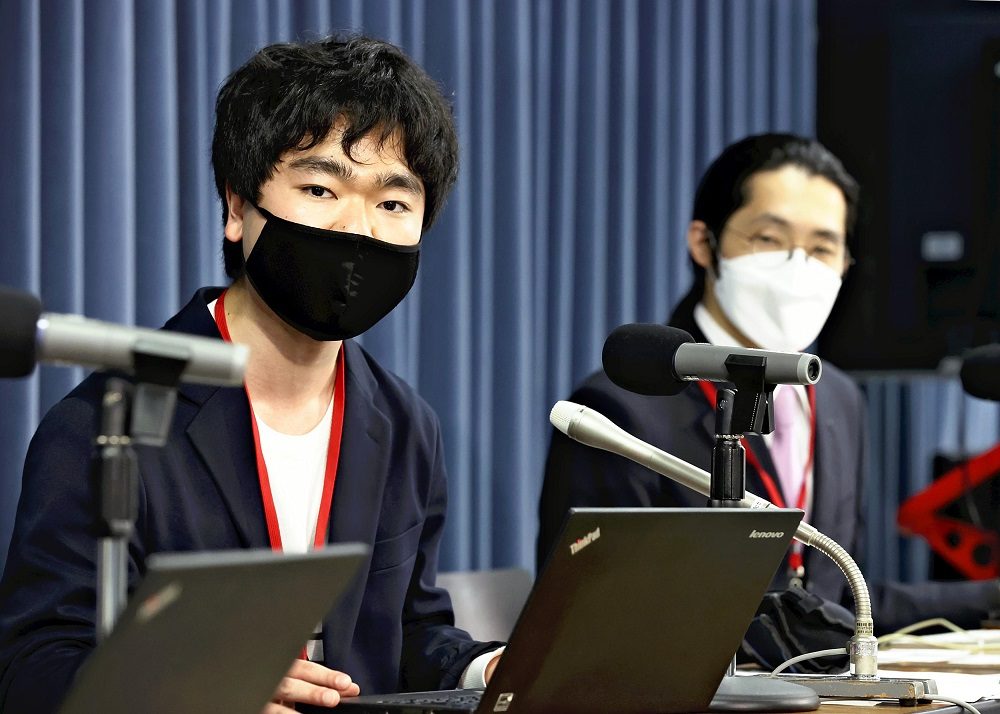
Creatives hold a press conference in Tokyo on Thursday.
18:26 JST, April 28, 2023
The emergence of powerful artificial intelligence tools such as ChatGPT has triggered concerns among creatives in Japan, where copyrighted material can be used to train generative AI, a breakthrough technology that can swiftly process large volumes of data, and create content, including audio, images and text.
Waseda Law School Prof. Tatsuhiro Ueno described the situation in Japan as a “paradise for machine learning.”
Article 30-4 of the Copyright Law permits the use of copyrighted works to train AI models almost without limitation.
“We should take advantage of this provision to improve AI technology. It will also have the effect of attracting foreign IT companies,” Ueno said.
However, that view is not shared by many copyright holders.
“There is a fear that AI will be used to generate content that differs from the intentions of creators whose works were used to train the technology, which could damage the reputation of the creators and their works,” said Fumio Tanai, executive director of the Japan Photographic Copyright Association.
Generative AI might have an impact on Japanese culture, including manga, anime and traditional literary forms such as haiku and tanka poems.
A few months ago, a 30-year-old Tokyo-based manga artist learned that about 20 of his works had been used without permission to train an overseas AI image generator.
The man, who started posting manga and illustrations on the internet about 10 years ago, has been an independent illustrator since 2019. He spends about 10 hours to create one illustration, three to four months to completing one manga episode, and earns about ¥4 million a year. “I feel like I’m working hard for the benefit of AI companies. I can’t understand this,” he said.
On Thursday, a group of more than 30 manga artists, musicians and other creatives met government officials, calling for measures to address the negative impact of generative AI on their creative activities.
At a press conference in Tokyo later in the day, royalty payments to copyright holders and the establishment of an opt-out system were among the suggestions presented by creatives.
“My work is being used by an AI image generator. I fear I might lose my opportunity to sell work. New measures must be taken to protect artistic culture,” one of the creatives said.
Under article 30-4 of the Copyright Law, a copyrighted work cannot be used by AI models if “the action would unreasonably prejudice the interests of the copyright owner.”
However, there is confusion among developers as the Cultural Affairs Agency has provided only a limited list of applicable cases, prompting calls for clear guidelines.
When Tokyo-based software developer Celsys Inc. tried to release software featuring an AI image generator last November, it received a number of comments from people who said they did not want to use the application if it was unclear whose copyrighted material had been used to train the AI model.
Celsys announced suspension of the release the following month, citing a lack of forethought.
“Even if it doesn’t violate the law, the thoughtless use of copyrighted material could lead to a company’s reputation being damaged,” said Koji Fujimoto, 61, chairman of AI developer Tensor Consulting Co. “I want [the government] to create a system that allows for smooth business operations.”
Lawyer Hajime Idei said: “The government and experts have not fully discussed what constitutes a case in which a copyrighted work cannot be used. It might be necessary to establish specific guidelines to dispel the concerns of copyright holders and developers.”
Top Articles in Society
-

JAL, ANA Cancel Flights During 3-day Holiday Weekend due to Blizzard
-

Record-Breaking Snow Cripples Public Transport in Hokkaido; 7,000 People Stay Overnight at New Chitose Airport
-

Australian Woman Dies After Mishap on Ski Lift in Nagano Prefecture
-

Foreign Snowboarder in Serious Condition After Hanging in Midair from Chairlift in Nagano Prefecture
-

Train Services in Tokyo Resume Following Power Outage That Suspended Yamanote, Keihin-Tohoku Lines (Update 4)
JN ACCESS RANKING
-

Univ. in Japan, Tokyo-Based Startup to Develop Satellite for Disaster Prevention Measures, Bears
-

JAL, ANA Cancel Flights During 3-day Holiday Weekend due to Blizzard
-

China Confirmed to Be Operating Drilling Vessel Near Japan-China Median Line
-

China Eyes Rare Earth Foothold in Malaysia to Maintain Dominance, Counter Japan, U.S.
-

Japan Institute to Use Domestic Commercial Optical Lattice Clock to Set Japan Standard Time





















